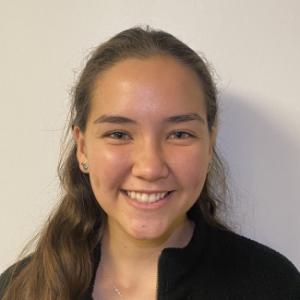Mariko Quinn

Mariko Quinn, also known as Mari, is a passionate marine science enthusiast and a junior at the University of Hawaii at Manoa. Growing up in Hawaii near Kaneohe Bay, her love for the ocean was deeply influenced by her father, a boat captain, and her upbringing near the water. Witnessing a coral bleaching event in 2015 sparked Mari's interest in marine life and coral reefs. In response, she conducted a science fair project to track the recovery of 24 individual coral colonies in her local reef, discovering the impact of environmental stressors and the resilience of some coral colonies. This experience propelled her to participate in various marine science programs and internships, leading her to be accepted into the prestigious Hollings Scholarship Program. Currently interning at the Hawaii Institute of Marine Biology, Mari is dedicated to her research on cryopreserving coral symbionts, a crucial aspect of coral conservation and restoration efforts.
Scope and Content Note
In the interview, Mari discusses her groundbreaking work on cryopreserving coral symbionts, aiming to support coral larvae growth in the future. She highlights the importance of preserving genetic diversity in corals, given the uncertainties surrounding the availability of the right types of symbionts. Mari explains the process of extracting symbionts from corals using innovative techniques, such as waterpiks, and concentrating them through filters and centrifugation. Despite the challenges, her research has achieved success in cryopreserving symbionts, showing promise for coral conservation. Additionally, Mari expresses concern about environmental issues in Hawaii, particularly the Red Hill bulk storage facility's fuel and chemical leaks into the aquifer. Lack of transparency and accountability from the US Navy has led to community distrust. However, she remains hopeful for the future of coral reefs, believing in their resilience and advocating for their protection through marine reserves like the Northwestern Hawaiian Islands.
Please Note: The oral histories in this collection are protected by copyright and have been created for educational, research and personal use as described by the Fair Use Doctrine in the U.S. Copyright law. Please reach out Voices@noaa.gov to let us know how these interviews are being used in your research, project, exhibit, etc. The Voices staff can help provide other useful resources related to your inquiry.
The NOAA mission is to understand and predict changes in climate, weather, oceans, and coasts, to share that knowledge and information with others, and to conserve and manage coastal and marine ecosystems and resources. The Voices Oral History Archives offers public access to a wide range of accounts, including historical materials that are products of their particular times, and may contain offensive language or negative stereotypes.
Voices Oral History Archives does not verify the accuracy of materials submitted to us. The opinions expressed in the interviews are those of the interviewee only. The interviews here have been made available to the public only after the interviewer has confirmed that they have obtained consent.
